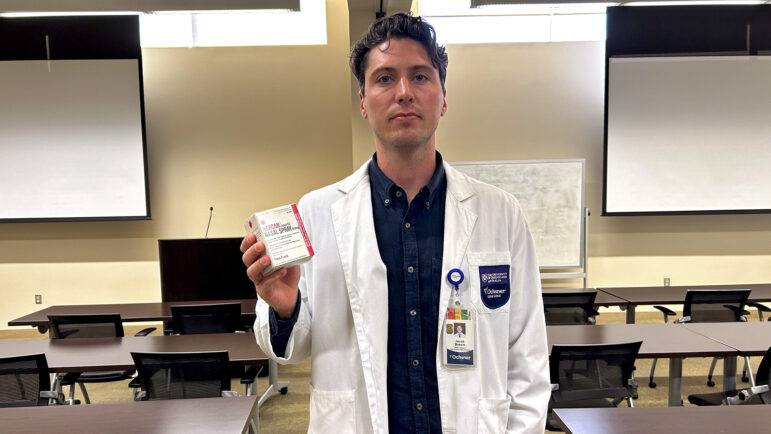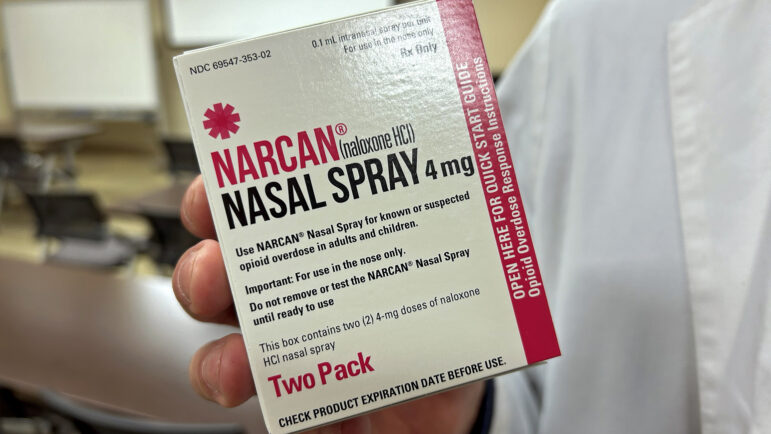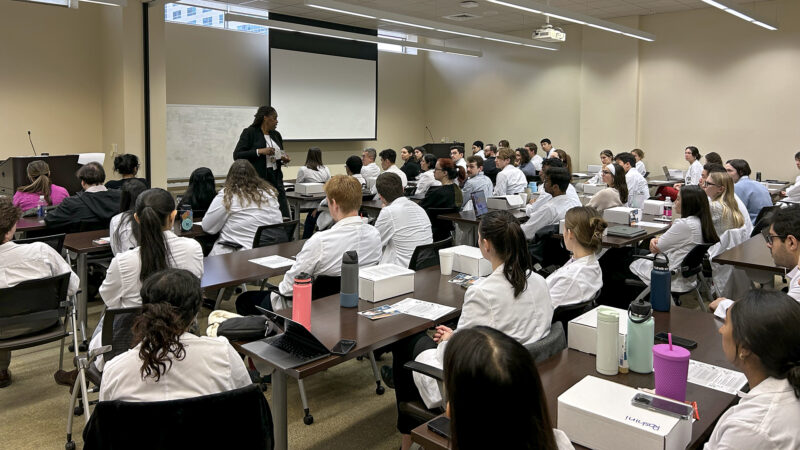Opioid overdoses are on the rise. A Louisiana medical student believes Narcan training can help
Sedera Montgomery demonstrates how to use Narcan to stop a fatal overdose to medical students at the UQ-Ochsner Clinical School in New Orleans on January 11, 2024.
School is back in session at the UQ-Ochsner Clinical School in New Orleans, and on this January morning, just over 80 medical students pack into a classroom.
Sedera Montgomery stands at the front, ready to start the day’s discussion: how to help stop a fatal opioid overdose with naloxone, a medication most commonly known as Narcan — its brand name.
“These are some of the signs and symptoms that you would see if a person was suffering from an overdose,” Montgomery says to the room of second and third-year medical students. “Their skin could be clammy, there could be loss of color, their lips and fingertips could be blue — they could be blue all over, depending on how long they have been without oxygen.”
Montgomery says if you suspect someone is having an overdose, the first thing to do is call for help. Then, she says, keep an eye out for signs that the overdose could turn fatal.
“Two cardinal signs are pinpoint pupils and this thing that I call a ‘death rattle,’ this deep, gurgling-type snore,” Montgomery says. “When that happens, you should be ready to act.”
Though you wouldn’t expect it, Montgomery later admits she was a little nervous during her presentation. She isn’t a professor at the school or a physician in a white lab coat. She’s a trainer with a nursing background who works for the Louisiana Department of Health’s Metropolitan Human Services District.
But Montgomery’s experience with treating overdoses makes her the perfect person to teach this subject. As the number of opioid overdoses in the Gulf South has risen over the past two decades, she’s witnessed the worst of the worst. This intimate knowledge of death wrought by the opioid crisis is apparent in the way she carries herself: upright and commanding, with the no-nonsense vibe of a high school principal.
Louisiana’s overdose death rate is nearly double the national average, and 95% of those deaths were caused by fentanyl — a synthetic opioid often mixed with other drugs to make the mixture stronger. Fentanyl is about 50 times more potent than heroin, making it easy to unintentionally take a deadly amount.
It’s an epidemic that does not discriminate, devastating entire communities regardless of age, sex, race, or socioeconomic status.
Montgomery continues the training by opening a box and pulling out a small device with a nozzle. It looks like a nasal spray bottle for allergies, but it’s actually a dose of naloxone. Spraying the drug directly into the nostril allows it to enter the bloodstream and take effect within seconds. This ability to quickly reverse a potentially fatal opioid overdose has led to some calling it a “miracle drug.”
“This is how you hold it,” Montgomery says, gripping the device. “Your thumb is on the plunger and ready to go.”
She then shows the students how to deliver a dose.
“Make sure it’s in the nostril.”
A student raises their hand and asks how you’d know if the device was in far enough. Your fingertips will touch the tip of that person’s nose, Montgomery replies.
“And once you get it there, you press,” she says, pressing the plunger and sending a small puff of mist rising into the air.
Each Narcan device contains a single dose of naloxone. Montgomery says it can sometimes take multiple doses to revive someone, though one can often do the trick.
Hitting close to home

With the demonstration over, Montgomery’s presentation takes a personal turn. She asks if any of the students have ever seen an overdose before. Immediately, multiple hands shoot up into the air.
One student says they were at an LSU football game when they saw a man passed out on the ground. Another tells the story of being at a bachelor party when a friend became unconscious and they had to get them to a hospital.
One student, Isabel Anderson, says she has a cousin who struggles with heroin addiction.
“It’s really hard to see when you have a family member whose whole personality changes and revolves around this drug,” Anderson said after the presentation. “And they’ll have moments of clarity where they’re like, ‘I really just don’t want to be like this,’ but it’s out of their control.”
Anderson has also seen people overdosing come into the clinic she works at as part of her medical education. That’s one reason she came to this training event.
The opioid crisis also hits close to home for Jacob Bassin, the fourth-year student who started the initiative to train and provide QC-Ochsner students with Narcan. When he was in high school, Bassin’s brother overdosed and died from heroin. It’s what made him want to get into medicine.
“Something took my brother away, and I want to know more about it and then turn that into something positive,” Bassin said.
When he got to medical school, Bassin told a doctor his story, who then encouraged him to start the training program.
Bassin hopes to take his Narcan training initiative to other medical schools in the region. His dream is to have as many people armed and trained with the life-saving medication as possible, so nobody has to lose a loved one to an overdose like he did.
Barriers to treatment

From the start of his initiative, Bassin faced one glaring issue — getting naloxone doses in the first place.
“I started emailing a bunch of different health organizations, seeing if they had any Narcan available because the big speed bump in the road was really funding to get the medication,” Bassin said. “Everyone wants to train, but it’s hard to get the actual medication.”
This isn’t an uncommon problem. Getting Narcan can be difficult in the Gulf South. It used to require a prescription in states like Alabama. But last year, the U.S. Food and Drug Administration approved selling Narcan over the counter in all 50 states.
Availability, however, is another lingering issue. In places like Mississippi, it can sometimes be hard to find in pharmacies. Part of the reason for the medication’s lack of availability is the stigma associated with drug use and addiction that persists in the region.
This stigma has historically prevented governing bodies in the Gulf South from implementing harm reduction strategies related to opioid abuse, such as providing clean needles, fentanyl test strips, safe injection sites and other measures, according to Lonnie Granier, administrator of the Coalition of Louisiana Addiction Service and Prevention Providers.
And while states are starting to dedicate more funding for overdose death prevention, like providing Narcan, Grandier said more efforts are needed.
Affordability also gets in the way. Narcan costs about $50, which could be prohibitive for some people — especially those struggling with addiction — to buy and keep on hand.
“We still have many barriers and a long way to go for the general public to be able to access naloxone at a pharmacy without judgment — with insurance, without insurance — at a cost that is affordable,” said Granier.
For Granier, overdose death prevention with medication like naloxone is the first step in helping people struggling with opioid addiction.
“But the goal of prevention should not only be reducing harm,” he said. “But establishing that individual and a continuum of services that is oriented toward recovery.”
This story was produced by the Gulf States Newsroom, a collaboration between Mississippi Public Broadcasting, WBHM in Alabama, WWNO and WRKF in Louisiana and NPR.
Hungary’s oldest library is fighting to save 100,000 books from a beetle infestation
Restoration workers are removing about 100,000 handbound books from their shelves and carefully placing them in crates, the start of a disinfection process that aims to kill the tiny beetles.
A military exercise drawing together 19 nations and 35,000 forces begins in Australia
The largest-ever war fighting drills in Australia is underway and expected to attract China's attention. Talisman Sabre began in 2005 as a joint exercise between the U.S. and Australia.
Trump marks anniversary of assassination attempt at the FIFA Club World Cup final
The president joined the players on the field after the match to present PSG players with their runner-up medals and hand Chelsea their championship trophy.
Wildfire destroys a historic Grand Canyon lodge and other structures
A park official said the visitor center, the gas station, a waste water treatment plant, an administrative building and some employee housing were among the 50 to 80 structures lost.
Jannik Sinner wins Wimbledon, Italy’s first singles champion
Italy's Jannik Sinner defeated defending champion Carlos Alcaraz to win his first Wimbledon title. Sinner is the first Italian to win the tournament.
Senate committee details failures by Secret Service in preventing Trump shooting
The Senate Homeland Security Committee said the Secret Service's "lack of structured communication was likely the greatest contributor to the failures" at the Pennsylvania rally last summer.









